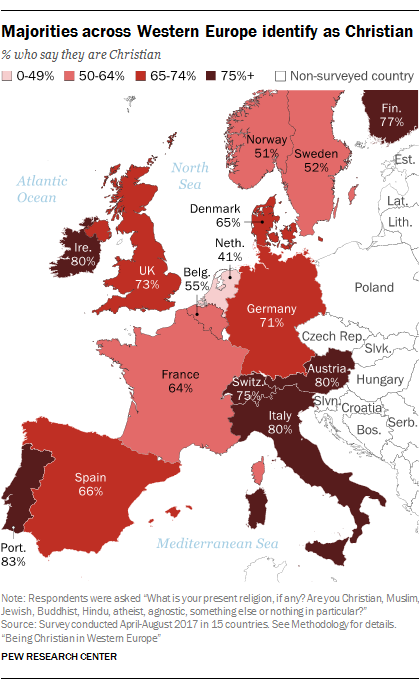
Being Christian in Western Europe
- By C Barnett --
- 30 May 2018 --

Christianity is a social marker
A survey done by the Pew Research Center spanning 15 Western European nations had surprising results. As per the survey, the majority of Western European Christians continue to believe Christianity to be a meaningful cultural, religious, and social marker.[/tweetit] This remains valid even for a largely non-practicing Christian populace.
Being Christian in Western Europe[/tweetthis]
The study had a broad ambit. Other than scanning religious beliefs and its practices, the survey also explores the views of respondents with respect to pluralism, national identity, and immigration. It also examined how religion is blended with attitudes on such issues.
The Pew Research Center study involved telephone interviews of 24,000 individuals. All were adults and randomly selected. The survey included 12,000 Christians who term themselves as non-practicing of their faith.
Non-practicing Christians are numerically superior to the religiously unaffiliated population. The religiously unaffiliated fold includes agnostics and atheists in most surveyed European countries. The recent wave of immigrants from North Africa and the Middle East has not changed much. The population of non-practicing European Christians is in higher numbers than the population of all other people of all religions in total.
It is observed that the cultural, religious, and political views of the non-practicing Christians frequently differ from Christians who regularly attend church. These views are also different from religiously unaffiliated adults. One key finding is Western Europe, although predominantly secular, continues to identify itself as Christian. About 71 percent of Germans and 64 percent of French express this view. Another peculiar find is that even though a majority identify as Christian in any given geography, only a minuscule amount actually visits a church. This premise is true in almost all European countries except Italy. The British are a potent example, with 55 percent non-practicing Christians overwhelming the 18 percent of the practicing ones. It is to be said that the number of non-practicing Christians are also more than religiously unaffiliated in most European nations.
The Pew survey revealed that Western European Christians, including the non-practicing ones, believe in a sort of higher power. They admit to believing in some superior spiritual force which they think exist in the universe. In comparison, Christians who regularly attend church believe in a God as described in the Bible. Yet another finding is that majorities in most European countries are willing to accept the presence of Muslims in their neighborhoods along with Muslim families. Multiculturalism is clearly present and strong in the European subcontinent.



















